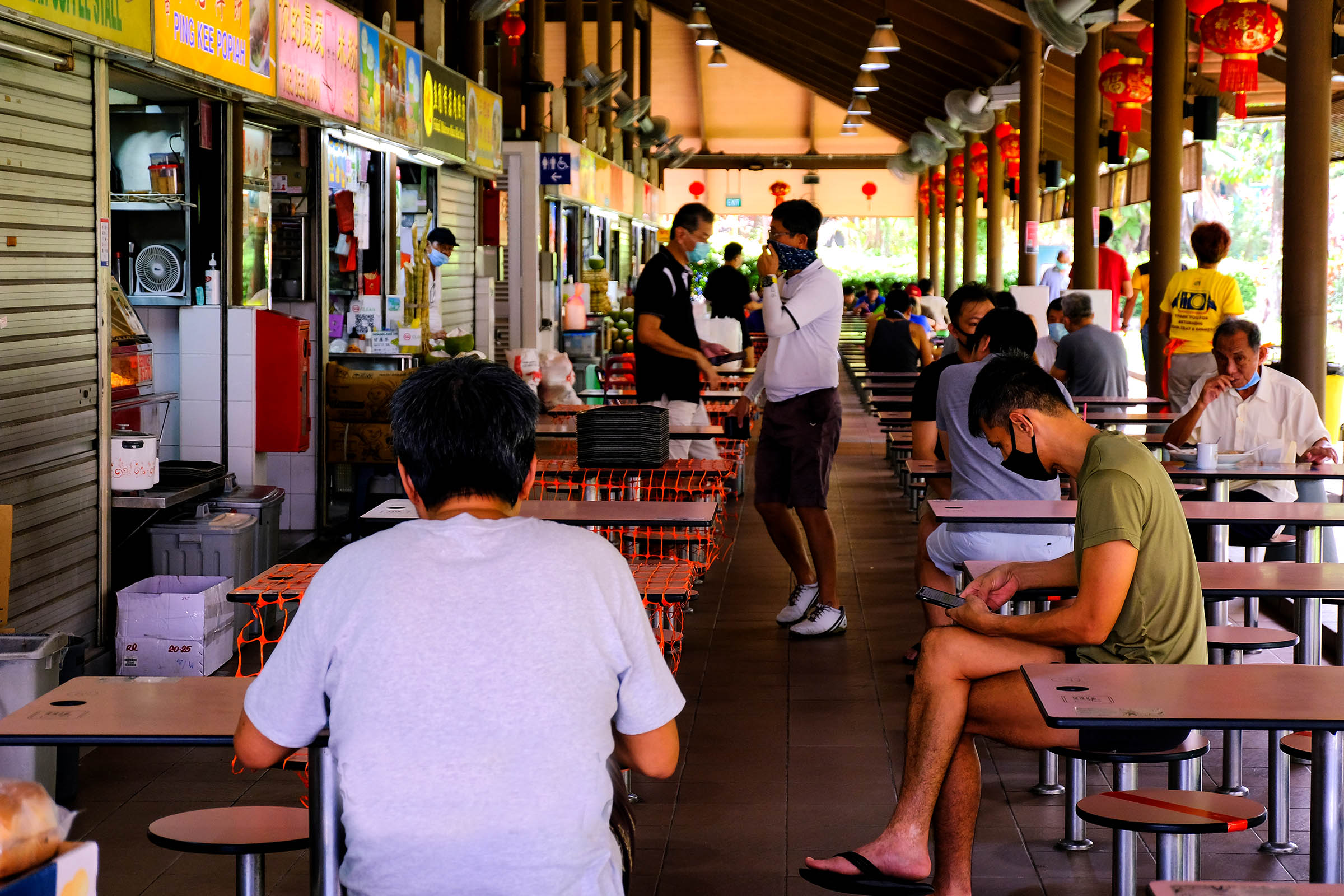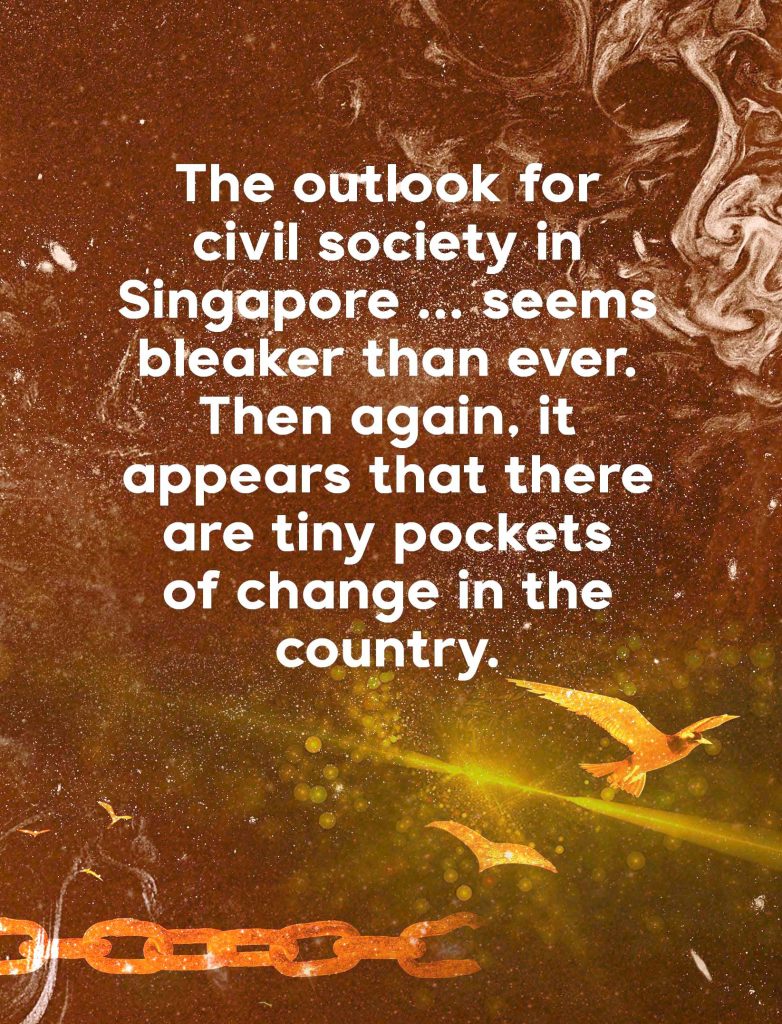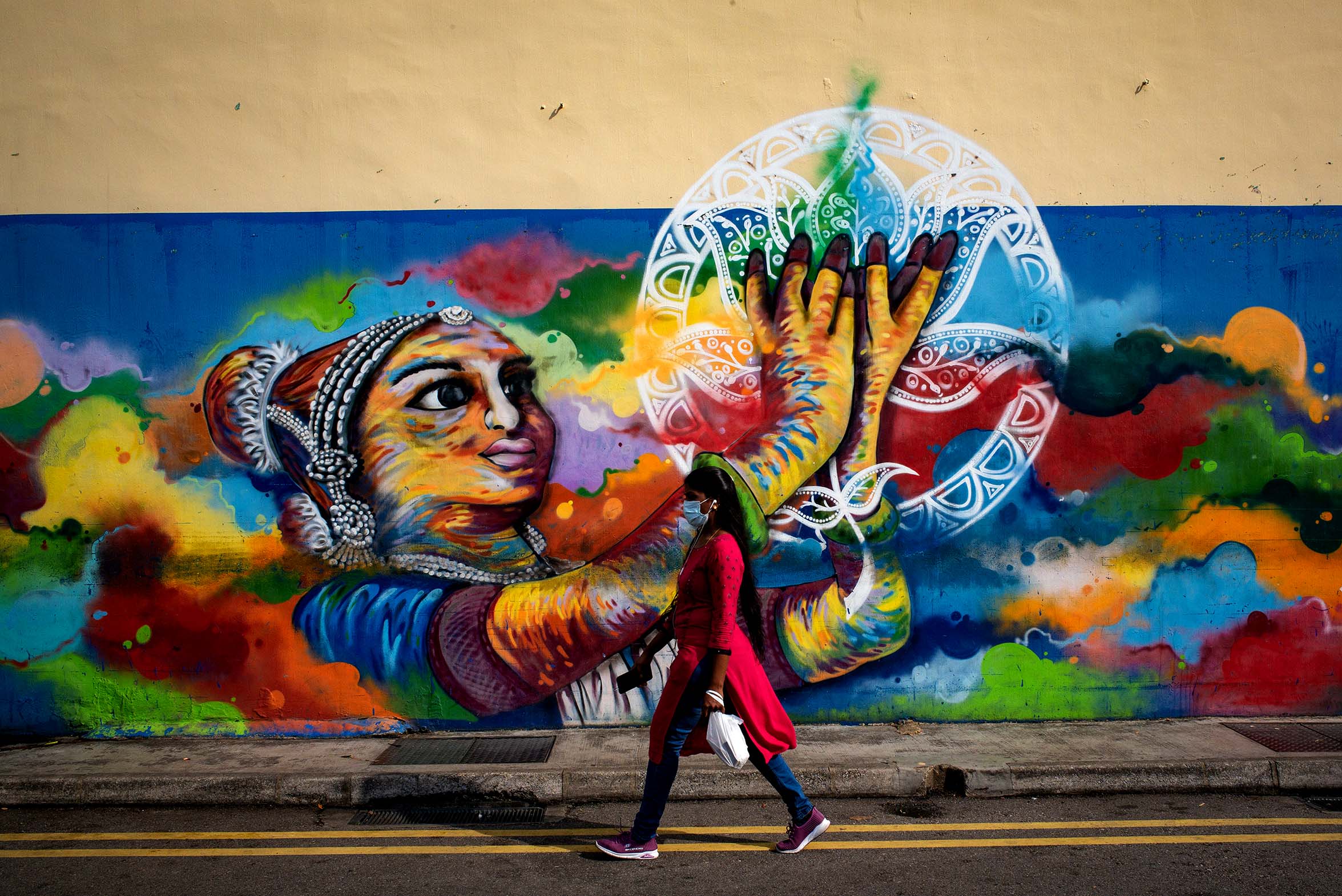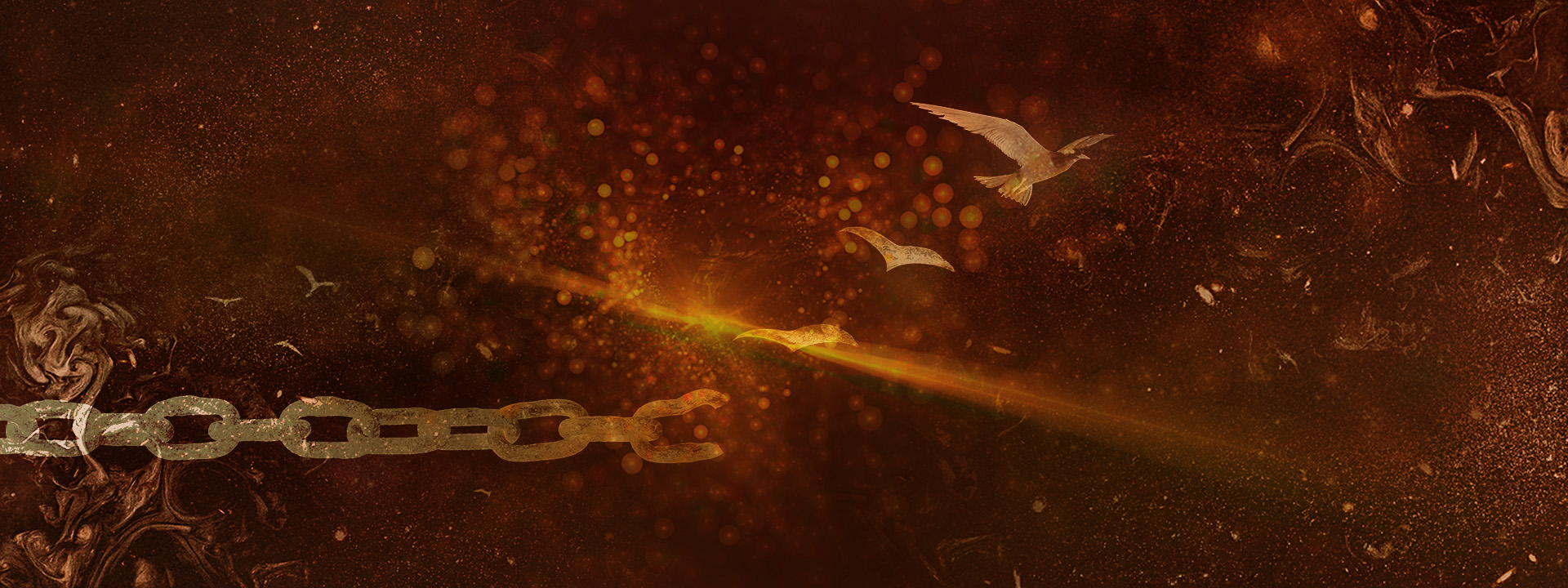For many nations, 2021 was a watershed year. The pandemic continued to rage, with a new variant threatening to destroy what little progress governments had made in 2020. The tiny island-nation of Singapore was not untouched by this, as it faced a continued COVID-19 crisis that had begun in 2020 among the migrant labor force, and which threatened to spill over into the rest of Singapore society.
In spic-and-span Singapore, spillovers of any sort are frowned on. That may be why throughout 2021, Singaporean authorities were busy doing cleanups of all kinds, especially of what they apparently consider distasteful or inappropriate, and even as they struggled to figure out how to contain the spread of the virus.
And so in the same year that the Singapore government — dominated by the People’s Action Party (PAP) since 1959 — decided it would start trying to live with the virus, an appeal against a colonial-era ban on gay sex was once again denied, in stark contrast to countries like India, which ended bans on gay sex, and Taiwan, which has made gay marriage legal. Meanwhile, two men convicted of drug trafficking are bound for the death penalty. One of them is a mentally impaired Indian-Malaysian man, another statistic in a country where the death penalty has been used disproportionately against racial minorities. International outrage and domestic civil society groups have managed to halt his execution so far, but it remains likely to be carried out in 2022.

Businesses reopen at one of Singapore’s hawker centers as restrictions ease and the nation tries to live with the SARS-CoV-2 virus instead of perpetually hiding from it. Beneath the surface, a lot more work needs to be done in civil society.
One of Singapore’s longest-running independent news sites, The Online Citizen, was also taken offline for failing to declare sources of its funding. The year that has just ended, after all, was also the year when the Singapore government passed a far-reaching law that threatens civil society’s ability to function or even exist within the country.
The Foreign Interference (Countermeasures) Act (FICA) is meant to protect the state and citizens from acts of foreign interference, according to the state. It gives the Minister for Home Affairs the power to investigate people who have foreign funding and run “hostile information campaigns.” Activists, academics, and civil society organizations, however, fear that it is meant to target them.
The outlook for civil society in Singapore, never the most positive in its history, thus seems bleaker than ever. Then again, it appears that there are tiny pockets of change in the country.
Anti-racism legislation, for instance, is to be introduced for the first time in Singapore’s history in 2022. And while the appeal against the gay sex ban was overturned, the appeal alone should be considered as progress, because public challenges such as that would have been unthinkable not too long ago. Even the stay of execution of drug offenders is new, as other anti-death penalty campaigns and appeals have failed. Within a restricted civil-society space, groups and individuals, therefore, seem to be making a meaningful difference, and, perhaps, bringing some much-needed hope.
Civil society, Singapore style
Civil society can be understood as a community of citizens linked by common interests and engaging in collective activity. It includes — but is not limited to — the wide range of activities undertaken by community groups, charities, and non-profit organizations. Despite their diversity, what members of civil society usually have in common is that they work for the interests of citizens while operating outside of the government. At least that’s the way civil society is understood in most countries, and that is also why it can be a threat to state power in many nations.

In Singapore, however, civil society is seen as “voluntary associations that are not political.” Rather than a civil society that challenges the state, some academics have defined Singaporean civil society as “a space that …(cooperates) with the state.” State control is so absolute in Singapore that civil society cannot exist outside of state confines. Organizations that try to push the boundaries usually find themselves shut down (like The Online Citizen) or brought to heel by loss of permits to function. The entirety of the state apparatus is used to silence and diminish not only organizations deemed too critical of the state, however, but also individual citizens who speak out too much.
Activist and social worker Jolovan Wham is well acquainted with the persecutory tactics of the Singapore state. A founding member and executive director of the Humanitarian Organization for Migration Economics, Wham has long been a public target for Singapore’s authorities. He has been prosecuted, arrested, and charged with numerous offenses that would seem ludicrous in other parts of the world. For example, he has been arrested for holding up a smiley-face cardboard sign, for organizing a public assembly, for refusing to sign police statements, and even for vandalism — he stuck a poster on a train window.
Wham believes that the underhanded tactics that have been deployed against him will continue to be used against other activists, simply because these have been successful for the PAP so far, and because the PAP’s control of the entire judiciary system means there are no challenges or checks to their power.
“We’re expecting the government and the ruling party to continue using the same old tricks of prosecuting, investigating, and demonizing individuals whom it disagrees with or doesn’t like,” says Wham. He also points to a tactic commonly used by the PAP, which has been documented by academics studying the state as well: embracing certain activists so as to limit dissenting voices while giving the impression of welcoming criticism.
It is a method academics refer to as “embedding the regime,” where the state actively encourages certain social organizations over others as a way of weakening and controlling civil society. Says Wham, “The government and the party will continue to co-opt other individuals and groups so that they don’t turn into critical voices who will speak up and organize against them.”
Basics before broader challenges
There are, of course, civil-society members who are choosing to take the middle road and are attempting to achieve their goals without either agitating or kowtowing to authorities. One of them is June Chua, founder and executive director of the T-Project, a nongovernmental organization fighting for trans rights in Singapore. Compared to other countries, Singapore is surprisingly progressive with trans rights, although only to a certain extent. Sex reassignment surgery was legalized as far back as 1973, but only if individuals had undergone sex reassignment surgery. Being transgender is classified as a disease, gay people cannot marry or adopt, and Article 377A still criminalizes gay sex. Trans sex workers face a barrage of abuse from the police, clients, and the public, with trans women being the majority of the victims. There are also no legal protections against being abused or fired for being trans.
Chua believes, though, that the challenge for T-Project is providing the most basic things for trans Singaporeans, such as safe housing and food. Trans people are often ostracized and kicked out of family homes in Singapore. “We are focusing on the first level of Maslow’s hierarchy of needs for the transgender community before we look into the broader challenges and issues of freedom and democracy,” she says. “We cannot argue or fight when you are hungry and homeless.”
Chua holds that what matters is what activists and NGOs are building in Singapore. Focusing on people who don’t have their most basic needs met rather than on lofty ideas of democracy and free speech, Chua wants to “build bridges first so that we will have a strong foundation later in the future to depend on when we need to have more support and allyship.”
In this way, Chua believes that there is hope for the future. The T-Project sees great possibility in working with the government, NGOs, and CSOs. Chua points out that the “T-Project has always been apolitical,” which means that as a civil-society group in Singapore, it stands a much higher chance of continuing to be able to serve its community with less intrusion from the state.

While Singapore celebrates Racial Harmony Day in July each year, many find the occasion wanting. One spark of hope, though, is that anti-racism legislation is expected to be introduced in 2022.
For all that he has been through so far, Wham himself is optimistic — albeit warily. He sees hope for the future, but only if Singaporeans are willing to use their voices and organize together.
“I think building solidarity on the ground and supporting one another are important if we want to expand freedom and democracy in Singapore, even with draconian laws such as POFMA (Protection from Falsehoods and Manipulations Act) and FICA as obstacles,” he says. “We still need to continue to resist, and speak up, but this will be much easier if our communities organize and are there for each other.”
It seems that there are two strands of civil society in Singapore — those who challenge the state and those who work within its confines. They both want the same thing, however: solidarity, and a ground-up approach that creates a strong foundation for civil society in the country.
If both sides work together, focusing on their common desires, perhaps there is hope for the future of democracy and human rights in Singapore after all. ●
Sangeetha Thanapal is a Singaporean social critic and activist who is currently based in Australia.



















